#American Sentence Poem
Explore tagged Tumblr posts
Text
Write the Year 2024—Week 46: Eurydice Reconsiders
Um. What can I say. I had kind of a dark idea for a short story and I turned it into an American Sentence Poem, which is what I do whenever I am especially lazy and behind. Title: Eurydice ReconsidersWC: 176 I have notonceassumed thatyouwould missme,even a little bit. I am no childhiding in the closetwaiting forMother’s regret. I have letthe scarf slip,the sleeve fall back,and the bruiseshave…
0 notes
Text

Cicada Sentences Vol. 2, 7.13.24 “Precedent Et Al, Elect"
@env0writes C.Buck Ko-Fi & Venmo: @Zenv0 Support Your Local Artists! Photo by @env0
Ringing Ear Stinging fear Tinnitus might escape Like the sweat drop from my nape
Flint water doesn’t stoke Sparks a bit, and man is woke Beneath a blood streaked night sky Drowns the populaces’ sigh
What rat will with this garbage race A leaders newly minted face Are these the shackles of our own making? Nations bred for someone’s taking?
Disappointment into denouement The Cold War beings to thaw Friends, countrymen, lend me your ears I lack mine to listen for four more long years
The tree that bears fruit shall be hacked to base Reminded more of its home and its place Soon the leaves will lie Like sleeping bodies, tumble, and die
#writeblrcafe#poeticstories#poetryportal#twc#spilled ink#wutispotlight#writtenconsiderations#alt lit#burningmuse#american poem#american politics#couplets#midwest gothic#suburban gothic#cicada sentences vol. 2#cicada sentences#env0 writes#artists on tumblr#artists of tumblr#writers and poets#poetswhisper#poetselixir#twcpoetry#writerscreed#abstractcommunity#savage words#smittenbypoetry
14 notes
·
View notes
Text
my favorite aspects of poetry/writing pt.1:
The American Sentence
Definition: Created by Allen Ginsberg, the American Sentence is essentially a haiku put together. An American Sentence consists of 17 syllables, and is often (but not always) ordered subject, verb, object.
"Put on my tie in a taxi, short of breath, rushing to meditate." - Allen Ginsberg
"Four skin heads stand in the streetlight rain chatting under an umbrella." - Allen Ginsberg
"This world and all the creatures in it are on fire and some of you know it." - Nion McEvoy (taken from "Ordinary Genius" by Kim Addonizio)
Importance: The American Sentence is a unique writing exercise that is often used as a starting point/base for a poem (however, it is also beautiful by itself). Because the American Sentence does not necessarily have to make sense, the writing built upon it can be messed around with.
More Info: https://paulenelson.com/american-sentences-2/
#writing ideas#writing#creative writing#writer#writeblr#on writing#writing life#the American sentence#allen ginsberg#ordinary genius#aspects of poetry#haiku poetry#haiku poem#haiku#writing exercise
4 notes
·
View notes
Text
The Ninth Day of Appraising Neglect
Appraisal in Neglect and Neglect in Appraisal by Maria L. Berg 2023 For this morning’s photographic adventure, I set out to capture appraisal in neglect and neglect in appraisal. With neglects first meaning being to pay little or no attention to, I thought it would be an interesting experiment to try to pay attention to something other than what I was taking a picture of while I took the…

View On WordPress
#abstract photography#Allen Ginsberg#art#contradictory abstract nouns#Contradictory Abstractions#imagination#light-forming photography#NaNoWriMo 2023#NaNoWrMo#new poem#November PAD Chapbook Challenge#November Photography Challenge#reality#The American Sentence
0 notes
Text
For this 2nd day of Pride Month I decided to talk about a woman I mentionned yesterday in the post about Renée Vivien (that you should absolutely read by the way, Renée Vivien is amazing) :
Natalie Clifford Barney !
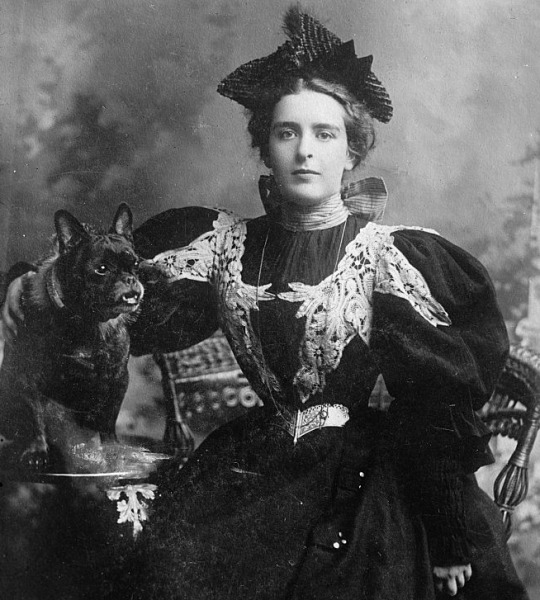
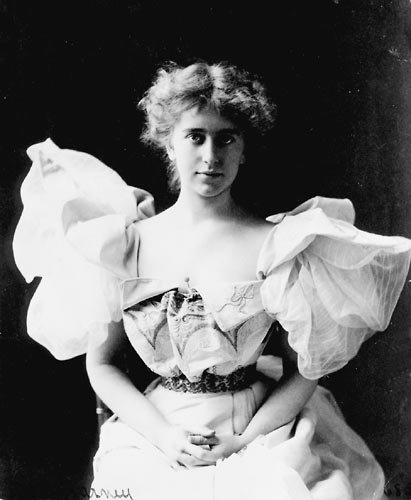
I talked about her to say that she's had a love story with Renée Vivien, but that's not the only thing she's done.
Natalie was born in 1876 in the United States and died in 1972 in Paris, at the age of 95. Writer and poet, she was the first woman to use the word "lesbian" in her writings (in this case a collection of poems, published in 1899), instead of the word "tribade" (it's another word for lesbian in french) or simply "homosexual". The word lesbian back then was even more taboo than it is today, so you can imagine how important this fact was (and still is).
She was also famous for the parties she organised: she held a literary salon which she wanted to turn into the "new Mytilene". She invited the female artists, writers and intellectuals of her time, in response to the all-male Académie Française, and they all spent whole afternoons and evenings in the flat of the wealthy American.
Natalie never tried to hide her homosexuality. As she said in a sentence that quickly became her most famous one,
"Why would anyone blame me for being a lesbian ?"
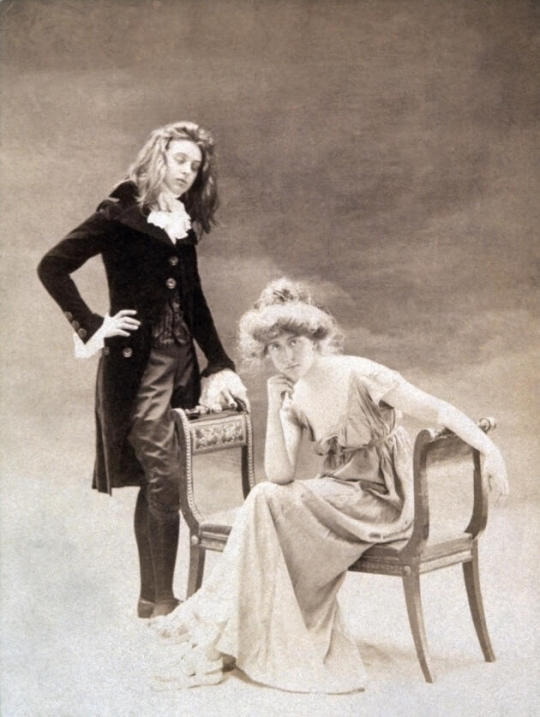
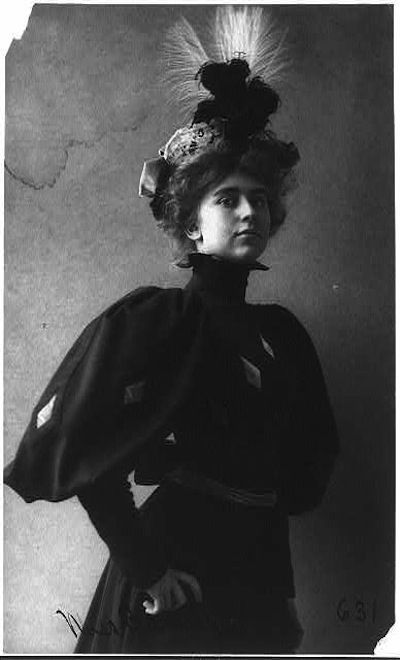
(Yes, that's her with Renée Vivien)
Natalie's mother (a renowned artist) and her tutor awakened her interest in the French language at an early age, and when she was a little older, she was sent to a school in France; thanks to this, she spoke French fluently and without an accent, and developed a soft spot for this country.
Natalie was 12 when she realized she was a lesbian, and decided right away to "live in the open, without hiding from anyone".
Hee first known relationship was with Liane de Pougy, a famous dancer of the time (whom she cheated on with many women). Natalie wrote about this love story in her collection Quelques portraits, sonnets de femmes. ("Some portraits, sonnets of women"). Liane wrote about it in her novel "Idylle sapphique", which so fascinated the French public that it had to be reprinted sixty times in the same year, with people torn between admiration and scandal. The two women eventually parted ways, however, due to Natalie's infidelities and Liane's "debauched lifestyle" (in Natalie's words).
As I said, this book caused a huge scandal. Natalie was forced to return to the United States, where her father burned all her writings he could find, and tried to marry her off. However, she categorically refused to obey him, and faced with her stubbornness, her father gave up, and Natalie returned to Paris, where she had a lot of lovers. Among these lovers, there's Renée Vivien (probably the most important, since Natalie never accepted their breakup and tried to get Renée back until Renée died at 32) Lucie Delarue-Mardrus, Colette, Emma Calvé, Olive Custance, Henriette Roggers and many others.
In 1902, on the death of her father, Natalie Clifford Barney inherited a large fortune and was able to rent a house in Neuilly-sur-Seine, where she gave parties that became the talk of the town.
In 1910, she moved into a house at 20 rue Jacob ; for nearly sixty years, this house was the setting for her famous "Fridays", one of the last influential literary salons. A LOT of famous people went there. Like really. The complete list is on Wikipedia if you're curious, and here's a screenshot with some examples :
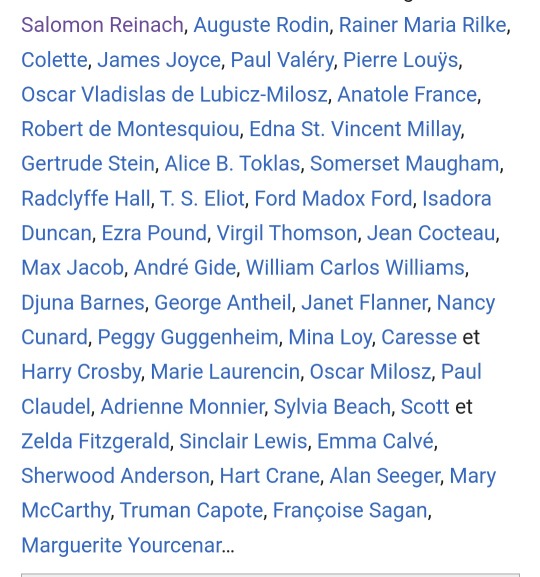
Marie Skłodowska-Curie went there. Albert Einstein went there. Apollinaire and Proust went there. Oscar Wilde went there. That's cazy to me!
She's had other lovers, like Elisabeth de Clermont-Tonnerre, but her greatest love story was with the painter Romaine Brooks, with whom she had a relationship similar to that of a married couple from 1914 to the end of her life. Of course, this didn't stop her from cheating on Romaine with other women: Natalie was known for her infidelities, believing that polygamy was necessary for a couple's survival, although she claimed that this didn't stop her from being deeply in love with Romaine. She cheated on her for example with Oscar Wilde's niece Dolly, and Nadine Huong, whose story I'll tell one day because it's so interesting!
She spent the years of the Second World War in Italy, and later returned to France to find her second home, which she shared with Romaine Brooks, destroyed. In 1949, she reopened her salon (which started to welcome more and more famous actors and actresses on top on everyone else).
Nothing much happened for the rest of his life. She never left Romaine Brooks (despite continuing to have affairs with a host of other women) and died in Paris in 1972, aged 95.
Natalie Clifford Barney's work and life were very important not only for culture itself, but also for the lesbian community. She made a major contribution to lesbian visibility, opened many minds, helped normalize (even if we still have a long way to go) homosexuality and, above all, helped many lesbian women accept themselves, understand that they were not alone and live the life they deserved.
The influence of her works and her salon on culture, literature, cinema, theater and even science is immense and deserves to be recognized. We should be talking about her much more than we are!
Here's some of her poems with an english translation :
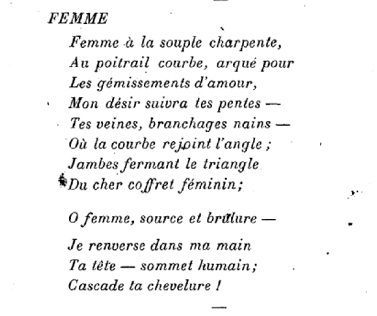
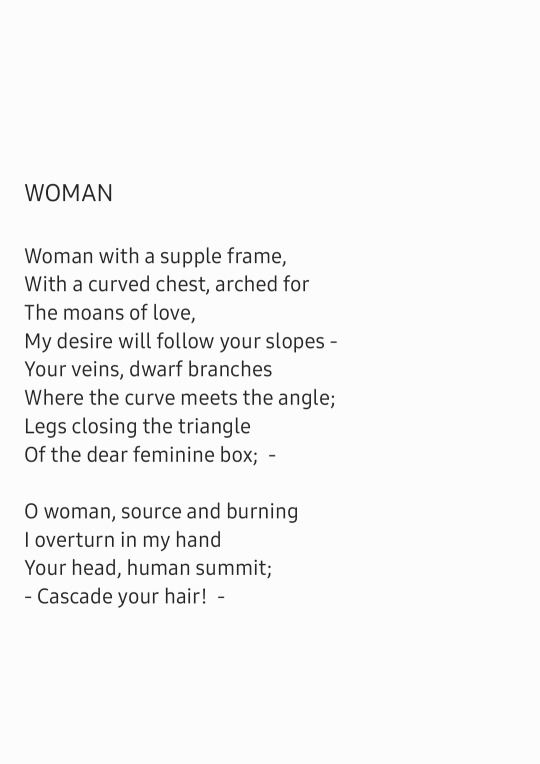
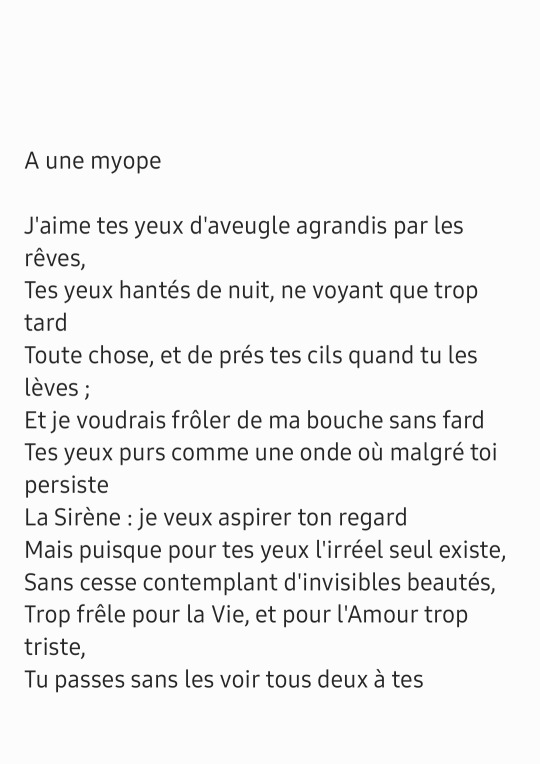
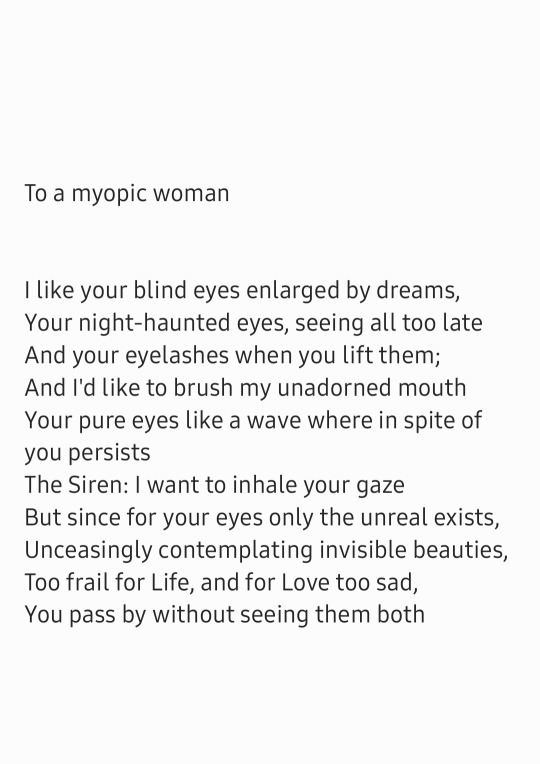
And she's written loads of other stuff that I really recommend you read! She was an interesting woman who wrote interesting things. Look her up on Google and read her writings and her life!
Anyway, that's it! Sorry for posting so late, and see you tomorrow for the 3rd lesbian pride post 🏳️🌈
#lesbian#lesbian pride#pride#pride month#lgb#lgbt history#lgbt#female homosexual#female homosexuality#female history#women's history#herstory#lesbian history#poetry#french poetry#poésie française#poésie#american writer#natalie clifford barney
140 notes
·
View notes
Text
✨GOetry - Ineffable Elfje ✨
Welcome to the Netherlands!
Our first stop on this ten week journey. I hope you have everything packed, got your bookmarks up, your pen licked and your digital paper at the ready.
*Hands you a welcome package including a stroopwafel, a piece of Gouda and a GOetry Booklet. Inside you find the tour schedule and a list of links.*
Useful links: Rhymezone - if you need a word. Syllable Counter Poetry Foundation Academy of American Poets Searchable bible
Hop on a bike and follow me for a quick tour of this fascinating country, much of which lies below sea level. A land of windmills, tulips, cheese, and canals, the Netherlands is known for its breath taking (very flat) landscapes and innovative waterworks.
Known for world-famous painters like Rembrandt and Vermeer, this small nation is rich in art and culture. But it’s also a powerhouse of engineering, with it's massive Delta Works protecting the land from the sea. And let’s not forget Rotterdam Harbour—the biggest port in Europe, buzzing with global trade and maritime activity.
As we arrive at a cozy canal boat in the heart of Amsterdam, you settle down with a steaming hot beverage, letting the warmth chase away the chill from our bike ride through the cold; it's time to explore our first prompt.
This week’s prompt:
Form: Elfje
Theme: Ineffable
What is an Elfje?
The Elfje form originated in The Netherlands where it is used to teach young children to write poetry. The word Elfje means ‘Elven’ or ‘Fairy’ poem (from ‘Elf’ meaning ‘elven’ or ‘fairy’ and the sufix ‘-je’ meaning ‘little’). The form consists of 11 words spread over 5 lines.
An ‘Elfje’ counts as five sentences.
Line 1: One word. This word symbolizes a colour or feature. The word symbolizes the atmosphere.
Line 2: Two words. These are something or someone with this colour or feature.
Line 3: Three words. Giving more information about the person or the object. You describe where the person or the object is, who the person or what the object is, or what the person or object is doing. This sentence usually starts with the word ‘he’, ‘she’ or ‘it.’
Line 4: Four words. Here you are writing something about yourself in relation to the person or the object. This sentence is your conclusion.
Line 5: One word. This word is called the ‘Bomb.’ It is the essence of the poem.
Example: (this one is an Elfje Acrostic)
Elegant
Little verse
Following simple rules
Just eleven words long
Elfje.
Post you result on your blog and don't forget to tag me @isiaiowin and use the #GOetry so I can see your work. You can also add it to the GOetry collection on AO3
Have fun! ~Moon💚
@goodomensafterdark
23 notes
·
View notes
Text
Reading Jhumpa Lahiri’s “The Namesake” was a riveting, almost delicate business for me. At several times I felt so attacked by the author that I was tempted to put the book down, yet the fragile personas of the characters drew me on past the pages.
It is a book from my Australian school’s English novel list. And so is “Wuthering Heights” or “Jane Eyre”. I read those with equitable interest, overanalysing every sentence, theme and character. I read background books, tried Milton’s “Paradise Lost”, Emily Brontë’s poems, Jane Austen’s “Pride and Prejudice”, all about the Brontë sisters’ household. I stormed through shelves in my university library, took refuge to the bedroom for reading up to late hours; I worked in a fever dream. The sheer excitement of navigating my way past great pieces of literature felt rewarding in itself. It was a foreign experience; as I had learned, along with my Bangladeshi peers, to read what was on the syllabus, without questioning what was within.
It all felt great, until I hit home.
All the above mentioned are written by individuals with whom I do not share my skin tone, my food habits or my accent. Therefore I “explore” them but not find myself within. Like an impartial observer, I rate this or that.
But Jhumpa Lahiri’s “Gogol” would not let me do that. His parents are Bengali, just like me. He is an American-Indian, just like I have a hyphen between my nationality too: Australian-Bangladeshi. And he is frivolous, which with great pains I will admit being too. His faults feel mine. Or at least, he annoys me, gets under my skin.
The novel opens with his birth and early childhood. He grows up indifferent to his ethnicity, preferring English, beef and high school parties over embracing Bengali, white rice and being involved in the culture he has a rightful share in. His family gives in too. I find myself enraged at their conduct, feeling grateful I came to Australia at a ripe age of sixteen- I am incapable of deserting my roots now. Then again, I discover that I have the same mentality as a middle-aged desi aunty, how shameful is that! Shouldn’t I be open-minded, and accept that Gogol has to cope with the country he was born in, rather than the one he has no attachment to?
Gogol’s mental stigma about his name is another side to his character that appears immature to me. He hates sharing a name with a Russian author, whom he finds demented than inspiring. He never sets to find out why his father Ashoke named him after his favourite Nikolai Gogol. It is a story he seeks out too late, a few weeks before Ashoke’s sudden death. He changes to “Nikhil”, even though he mentally admits no one, except he himself, has ever pestered him for the name he was born with.
Even though it isn’t directly pronounced, Gogol (now Nikhil) always tries to break free of Bengali “norms” and his parents’ expectations, unapologetically. This is reflected in his numerous love affairs with various women. But his attention is always fleeting. He’d rather be on holiday with his girlfriend’s “elegant” parents than his own. How does he fail to notice, as I do as a reader, that he indeed seeks out the idea of “settling down” in his partners in a very Bengali way, but miserably fails every time?
Something about his romantic life scares me. Will I, as a hyphenated Bengali girl, experience the same troubles as him? Will complying with my tradition feel unnatural to me some day too? As I read past Moushumi’s Parisian cigarettes and the descriptions of fine wine, do I not feel tempted? To go ahead, break the “rules” and enjoy “life”, as they say it?
And the lonesome, tired corner of my soul says that thousands of kids have broken the rules, there are no more to be newly broken. Do they really enjoy life like a one-night-stand? I highly doubt so.
As my mother’s words ring in my ears, “Love, keep your romantic life simple, so you’ll get time to do great things in life itself!”
Yet, I feel bitter as Gogol does not utter a single word of regret as the novel comes to an end. It is almost as if I am his mother, waiting to box his ears and set him right. But he wouldn’t admit that he was wrong, all his life.

#girlblogging#desiblr#light academia#dark academia#gaslight gatekeep girlblog#romantic academia#this is a girlblog#desi girl#brisbane#queensland#jhumpa lahiri#the namesake#nikolai gogol#gogol ganguli#books and libraries#books and reading#booklr#books & libraries#reading#currently reading#book review#bookblr#spilled words#spilled ink#spilled thoughts#spilled writing#jane austen#wuthering heights#emily bronte#english literature
12 notes
·
View notes
Text

During the Republican Era, Shen Zhiheng, a member of the Tianjin gentry who happened to be a vampire, offended the Japanese and became the target of an assassination attempt. He was saved by a blind young lady, Mi Lan, and his best friend Situ Weilian. When he went to repay Mi Lan for saving him, he discovered the terrible family situation that Mi Lan was in, and so began to pay more attention to her. Meanwhile, Shen Zhiheng’s plan to take revenge on Li Yingliang, the mastermind behind his assassination, fell short of success thanks to Li Yingliang’s Japanese superior, raising suspicions about his identity. Since then, Li Yingliang and the Japanese were in hot pursuit of Shen Zhiheng, determined to dig out the truth about his secret.
Binged Snowfall, fell absolutely in love with it, finished the novel, and decided to try my hand at my very first proper translation project 🥹
Please do not repost this anywhere else or retranslate it! For different sentences/ phrases, I’ve chosen to either translate close to the original Chinese phrase or to replace it with something that is more commonly understood in English, depending on the context. Retranslating this English translation to another language may further dilute the original Chinese meaning.
Translation footnotes will be available at the end of each chapter for any words/ phrases I feel need a more detailed explanation of nuances.
MAIN DIRECTORY ☾ READ ON AO3

Shen Zhiheng [1] could be considered a good person, in fact, a relatively decent one at that.
He was in his late twenties at least, or his early thirties at most, in any case, he was in the prime of his life. His looks were also of a decent calibre: he was tall, like a clothes rack, and was even more sophisticated in his dressing, always in a proper suit, as if he could stand behind a glass window at any time and pretend to be a mannequin.
Not only was his personal appearance already of such a level of perfection, his assets and wealth were also abundant. Although his origins were a bit of a mystery, within the Beiping [2] and Tianjin region, he had started by investing in newspaper companies to make a fortune. After that, with his shrewd acumen for finance, he had spread his investments everywhere, using money to make more money, and had rapidly become famous in Tianjin. Beyond his wealth, he also published poems and essays frequently in the newspapers. Although some said that those poems and essays were ghostwritten, but there was really no need to nitpick over such an issue. As long as everyone knew that he was both talented and rich, both handsome and wealthy, that was enough.
Now that he had both money and time, and that he was a major investor of several large newspapers, two of which were in the concession zones, he could rely on the support of his English, French, and American friends, and even on the gangs to have his back. The newspapers he supported had nothing to fear, daring to publish any piece of news, to scold any person, and had even offended the Japanese this year.
The Japanese themselves did not understand how far his resources reached, that he could actually dig up their political secrets, and after that, publish those secrets directly in the newspapers instead of making use of them to enter negotiations with the Japanese. This caused a societal uproar, and even a few student protests. And because they could not get a grasp on his social connections, the Japanese did not dare to fall out with him. Instead, they first tried to dangle carrots in front of him, trying to use benefits and sentiments to move him. Little did they know that Shen Zhiheng was a cold-hearted young gentleman with no lack of money, and who entirely could not be moved. This caused a certain Commissioner Yokoyama Akira [3] to be very annoyed, as if he were playing a game of unrequited love and had been met with complete ignorance, to his complete humiliation.
Annoyed, the commissioner wanted to have Shen Zhiheng killed. Actually, Shen Zhiheng also knew that there was a possibility that the commissioner wanted to have him killed. However, in recent years, his life had been smooth sailing, too smooth, that it caused him to be blindly positive, and not take this possibility seriously. It was to the extent that when the commissioner decided to make his move, Shen Zhiheng was still absentmindedly making public appearances. As he had in previous years, he organised a charity event, where he gave the local beggars a cotton-padded jacket and five cents each.
Everyone thought that Shen Zhiheng was a good person, and on this point, Shen Zhiheng agreed with them. He also thought that he was not bad, at least he could live up to the word “good”. The only unresolved question: he didn’t know if he could be considered a person [4] or not.
Fortunately, this was not too urgent a question. After all, compared to everyone else, he looked even more like a human, and at least for the time being, he wouldn’t go so far as to say that he would be treated as a demon and burned to death. Besides, this question was not necessarily unsolvable. For close to ten years, Shen Zhiheng had been pretending to be human and flourishing, and he believed that he could find the answer for himself.
Unfortunately, this night, while he was on his way home, the self-confident Shen Zhiheng accidentally had his head blasted, and then even ground to pulp by a car.
Mr. Shen wanted to cry yet simply had no tears left, and very nearly died from agony.
------------------------------------------------------------
In the original novel, the characters for Shen Zhiheng’s name are 沈之恒, which differs from the 沈之衡 used in the drama. Both 恒 and 衡 are pronounced as “héng”. However, while the former means “lasting” or “constant”, the latter means “to judge” or “to measure”, or to refer to something that is balanced. However, in certain scenes of the drama, Shen Zhiheng’s name is still written as 沈之恒, although the subtitles and drama marketing materials use 沈之衡.
What Beijing was called from 1928.
The Kanji characters of Yokoyama Akira are 横山 瑛, which in Mandarin Chinese pronunciation, is “héng shān yīng”, with “Hengshan” being his surname and “Ying” being his given name. In the show, as the Japanese people have been replaced with Chinese people instead, Yokoyama Akira is now Chi Shanying 池山英 “chí shān yīng”, with “Chi” being his surname and “Shanying” being his given name.
As in “human”. The Chinese character 人 (rén) can refer to both a person as an individual, or a human as in a human being.
#snowfall#冰雪谣#the shadow#如月#snowfalltl#userdramas#vampires#translation#*transl#tuserashinlae#lextag#roserayne
21 notes
·
View notes
Text
THIS DAY IN GAY HISTORY
based on: The White Crane Institute's 'Gay Wisdom', Gay Birthdays, Gay For Today, Famous GLBT, glbt-Gay Encylopedia, Today in Gay History, Wikipedia, and more … January 4



1750 – France Bruno Lenoir and Jean Diot are caught having sex in public for which they are arrested. A year later they were executed. There was general surprise in France at the severity of their sentence. Their execution was the last in France for consensual sodomy.

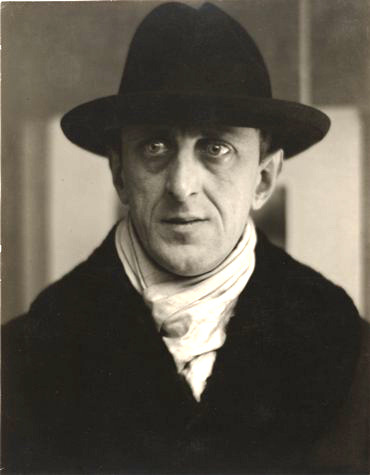
1877 – Marsden Hartley (d.1943) was an American Modernist painter, poet, and essayist. Hartley was born in Lewiston, Maine, where his English parents had settled.
In 1898, at age 22, Hartley moved to New York City to study painting at the New York School of Art. Hartley was a great admirer of Albert Pinkham Ryder and visited his studio in Greenwich Village as often as possible. His friendship with Ryder inspired Hartley to view art as a spiritual quest.
Hartley first traveled to Europe in April 1912, and he became acquainted with Gertude Stein's circle of avante-garde writers and artists in Paris. Stein, along with Hart Crane and Sherwood Anderson, encouraged Hartley to write as well as paint.
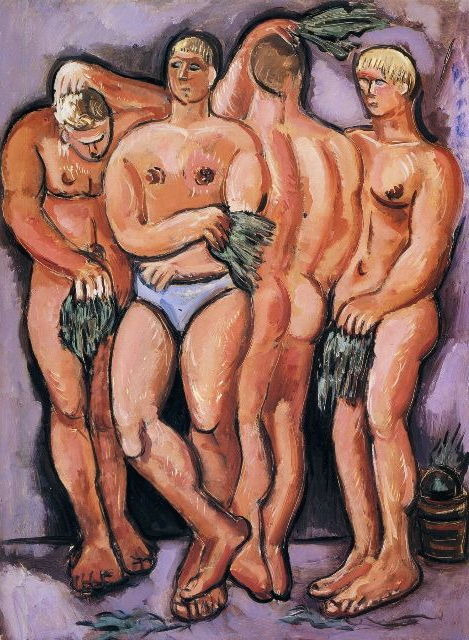
Finnish-Yankee sauna
In 1913, Hartley moved to Berlin, where he continued to paint. Many of Hartley's Berlin paintings were further inspired by the German military pageantry then on display, though his view of this subject changed after the outbreak of World War I, once war was no longer "a romantic but a real reality." The earliest of his Berlin paintings were shown in the landmark 1913 Armory Show in New York.
In Berlin, Hartley developed a close relationship with a Prussian lieutenant, Karl von Freyburg, who was the cousin of Hartley's friend Arnold Ronnebeck. References to Freyburg were a recurring motif in Hartley's work, most notably in Portrait of a German Officer (1914). Freyburg's subsequent death during the war hit Hartley hard, and he afterward idealized their relationship. Many scholars believe Hartley to have been gay, and have interpreted his work regarding Freyburg as embodying his homosexual feelings for him.
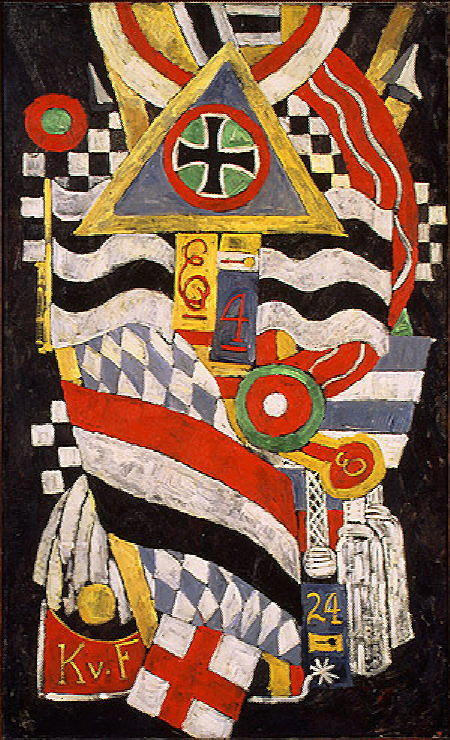
Portrait of a German Soldier
In addition to being considered one of the foremost American painters of the first half of the 20th century, Hartley also wrote poems, essays, and stories.
Cleophas and His Own: A North Atlantic Tragedy is a story based on two periods he spent in 1935 and 1936 with the Mason family in the Lunenburg County, Nova Scotia, fishing community of East Point Island. Hartley, then in his late 50s, found there both an innocent, unrestrained love and the sense of family he had been seeking since his unhappy childhood in Maine. The impact of this experience lasted until his death in 1943 and helped widen the scope of his mature works, which included numerous portrayals of the Masons.
He wrote of the Masons, "Five magnificent chapters out of an amazing, human book, these beautiful human beings, loving, tender, strong, courageous, dutiful, kind, so like the salt of the sea, the grit of the earth, the sheer face of the cliff." In Cleophas and His Own, written in Nova Scotia in the fall of 1936, Hartley expresses his immense grief at the tragic drowning of the Mason sons. The independent filmmaker Michael Maglaras has created a feature film Cleophas and His Own, released in 2005, which uses a personal testament by Hartley as its screenplay.

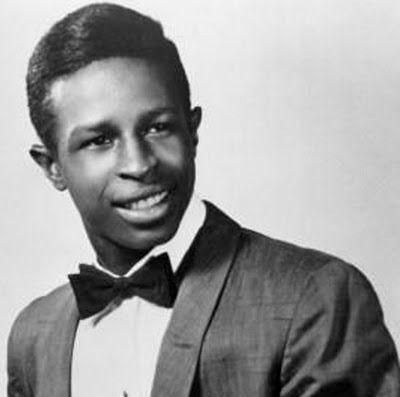
1946 – Arthur Conley aka Lee Roberts (d.2003) was a U.S. soul singer, best known for the 1967 hit "Sweet Soul Music".
Conley was born in McIntosh County, Georgia, U.S., and grew up in Atlanta. He first recorded in 1959 as the lead singer of Arthur & the Corvets. With this group, he released three singles in 1963 and 1964 – "Poor Girl", "I Believe", and "Flossie Mae" – on the Atlanta based record label, National Recording Company.
In 1964, he moved to a new label (Baltimore's Ru-Jac Records) and released "I'm a Lonely Stranger". When Otis Redding heard this, he asked Conley to record a new version, which was released on Redding's own fledgling label Jotis Records, as only its second release. Conley met Redding in 1967. Together they rewrote the Sam Cooke song "Yeah Man" into "Sweet Soul Music", which, at Redding's insistence, was released on the Atco-distributed label Fame Records, and was recorded at FAME studios in Muscle Shoals, Alabama. It proved to be a massive hit, going to the number two position on the U.S. charts and the Top Ten across much of Europe. "Sweet Soul Music" sold over one million copies, and was awarded a gold disc.
After several years of hits singles in the early 1970s, he relocated to England in 1975, and spent several years in Belgium, settling in Amsterdam (Netherlands) in spring 1977. At the beginning of 1980 he had some major performances as Lee Roberts and the Sweaters in the Ganzenhoef, Paradiso, De Melkweg and the Concertgebouw, and was highly successful. At the end of 1980 he moved to the Dutch village of Ruurlo, legally changing his name to Lee Roberts — his middle name and his mother's maiden name. He promoted new music via his Art-Con Productions company. Amongst the bands he promoted was the heavy metal band Shockwave from The Hague. A live performance on January 8, 1980, featuring Lee Roberts & the Sweaters, was released as an album entitled Soulin' in 1988.
Conley was gay, and several music writers have said that his homosexuality was a bar to greater success in the United States and one of the reasons behind his move to Europe and his eventual name change. In 2014, rock historian Ed Ward wrote, "[Conley] headed to Amsterdam and changed his name to Lee Roberts. Nobody knew 'Lee Roberts,' and at last Conley was able to live in peace with a secret he had hidden – or thought he had – for his entire career: he was gay. But nobody in Holland cared."
Conley died from intestinal cancer in Ruurlo, Netherlands aged 57 in November 2003. He was buried in Vorden.


1960 – Michael Stipe has been the lead singer, lyricist, and composer for the successful rock band R.E.M. for over two decades. Among his best-known songs is "Losing My Religion," which rose to number 4 on the United States rock charts in 1991. He has also become involved in film and now has his own production companies.
The child of a career military officer, John Michael Stipe, born in Decatur, Georgia, grew up on bases around the United States and also in Germany, and spent his high school years in Illinois.
Stipe returned to Georgia for college, enrolling as an art student at the University of Georgia in 1978. There he met fellow alternative music fans Peter Buck, Mike Mills, and Bill Berry. Within a year all four had dropped out of college to forge a career as a rock band, R.E.M.
They went on a concert tour and in 1980 put out their first single, "Radio Free Europe." Its success, particularly on college radio stations, won them a recording contract. Their first full-length album, Murmur (1983), was chosen as Album of the Year by Rolling Stone magazine.
Stipe's vigor on stage contributed to the success of R.E.M.'s concerts. He interacted with the audience and charged about with boundless energy. He blasted his often dark and brooding lyrics into the microphone with such force that they were frequently barely intelligible.
In addition to composing and performing, Stipe has also directed several of R.E.M.'s music videos and oversees the creation of their album covers.
By 2004 the band had recorded nearly twenty albums with collective sales of almost fifty million copies worldwide, making it one of the most successful in the history of rock music.
With the success of the albums Out of Time (1991) and Automatic for the People (1992), R.E.M. became mainstream music stars. Around 1992, rumors that Stipe had contracted HIV began to circulate. According to Stipe, he did not start the rumor and he does not know who did.
Not that I can tell. I wore a hat that said 'White House Stop AIDS'. I'm skinny. I've always been skinny, except in 1985 when I looked like Marlon Brando, the last time I shaved my head. I was really sick then. Eating potatoes. I think AIDS hysteria would obviously and naturally extend to people who are media figures and anybody of indecipherable or unpronounced sexuality. Anybody who looks gaunt, for whatever reason. Anybody who is associated, for whatever reason - whether it's a hat, or the way I carry myself -as being queer-friendly.
In 1994, with questions still swirling about his sexuality, Stipe described himself as "an equal opportunity lech," and said he did not define himself as gay, straight, or bisexual, but that he was attracted to, and had relationships with, both men and women.
In 1995, he appeared on the cover of Out magazine. Stipe described himself as a "queer artist" in Time in 2001 and revealed that he had been in a relationship with "an amazing man" for three years at that point. Stipe reiterated this in a 2004 interview with Butt magazine. When asked if he ever declares himself as gay, Stipe stated, "I don't. I think there's a line drawn between gay and queer, and for me, queer describes something that's more inclusive of the grey areas."
In 1999, author Douglas A. Martin published a novel, Outline of My Lover, in which the narrator has a six-year romantic relationship with the unnamed lead singer of a successful Athens, Georgia-based, rock band; the book was widely speculated, and later confirmed by its author, to have been a roman à clef based on a real relationship between Martin and Stipe. The two had previously collaborated on two books, both in 1998: The Haiku Year (for which the two had both contributed haikai) and Martin's book of poetry Servicing the Salamander (for which Stipe took the cover photograph).


1965 – Craig Revel Horwood is an Australian-British author, dancer, choreographer, conductor, theatre director, and former drag queen in the United Kingdom. He is also a patron of the Royal Osteoporosis Society.
Horwood is best known as a judge on the popular BBC dancing series Strictly Come Dancing, and until 13 November 2021, as he tested positive for COVID-19 and missed the following week's show, had been the only judge to have appeared in every edition since its inception. He is often seen performing ballroom and Latin routines including, in 2019, a performance themed around Hello, Dolly!.
Horwood has a waxwork in Madame Tussauds Blackpool which has been on display since July 2018. On 20 July 2021, Horwood was given an Honorary Doctor of Arts by the University of Winchester at Winchester Cathedral.
He was born in Ballarat, Australia. His father Phil was a former Royal Australian Navy Lieutenant whose alcoholism had "torn their family apart". He started his career as a dancer in Melbourne, then moved to London to take advantage of the greater opportunities available there and to dance competitively. In 1989, he moved to the UK from Australia, and on 20 August 2011, he became a British citizen.
Revel is Horwood's middle name; it is not double barrelled. In his autobiography, Horwood reveals that at the age of 17, he made money by appearing as a drag queen in bars and clubs and that his relationship with an unnamed celebrity was akin to prostitution.
Horwood was married to Jane Horwood from 1990 to 1992. In December 2014, Horwood informed a reporter from OK! magazine that 'I was bisexual for a long time. I flitted between men and women quite a lot between the ages of 17 and 26. My wife Jane left me for another man. Then I fell in love with a bloke. I have been gay ever since.' His former partner Damon Scott had been a runner up on Britain's Got Talent.
Since early 2018, Horwood has been in a relationship with horticulturist Jonathan Myring. In April 2020 Horwood and Myring announced their engagement. The pair, who met on Tinder, became engaged while in Tasmania.
Horwood became a patron of the Royal Osteoporosis Society in 2009. In this, he has found common ground with Camilla, Queen Consort, the Society's Royal patron (whose mother, like his, had bone disease). The two of them danced the cha-cha-cha together, on a school visit to mark National Osteoporosis Day in 2009.
In January 2015, Horwood revealed on ITV's Loose Women that he suffered from anorexia and body dysmorphia as a teenager and young dancer, as a result of trying to make himself look like other young men, and other dancers in particular.The 14th British series of Who Do You Think You Are? featured Horwood's ancestry in the second episode; in this, his family history research took him home to Australia, where he discovered that his family tree traces to Gloucestershire, Lancashire and Essex in England. Horwood found out that he is not the first dancer in his family, and that he is descended from gold prospectors that went bankrupt before becoming rich on finding a 250-ounce (7.1 kg) gold nugget. He also learnt further that his great-great-grandfather, Moses Horwood, who is revealed in the programme to have been a petty criminal from England, was convicted at the Gloucestershire assizes and transported to Van Diemen's Land (Tasmania) in 1841. Criminal records identified by TheGenealogist include a transportation document for Moses Horwood, showing he departed England on 1 December 1841 on board a ship called the John Brewer.


1970 – Christopher Klucsarits, better known as Chris Kanyon (d.2010), US Professional wrestler, best known for his work in World Championship Wrestling and the World Wrestling Federation, under the ring names Kanyon and Mortis.
In 2006, after Kanyon's release from WWE, he began a gimmick in which he was an openly homosexual pro wrestler. This included a publicity stunt wherein he stated that WWE released him from his contract because of his sexuality. Kanyon later told reporters and even stated on a number of radio interviews, that this was just a publicity stunt and he was heterosexual. However, he later retracted these statements and acknowledged that he was in fact homosexual.
Before his death Kanyon was working on a book, Wrestling Reality, with Ryan Clark. The book was released November 1, 2011, and it features Kanyon's struggles as a closeted gay man as a prominent theme.


1984 – Illinois repeals its "lewd fondling or caress" law, more than two decades after repealing its sodomy law.


1997 – A British tabloid accuses Conservative M.P. Jerry Hayes of having an affair in 1991 with a then-18-year-old male. At the time, 18 was under the age of consent.


18 notes
·
View notes
Text



* * * *
LETTERS FROM AN AMERICAN
January 31, 2025
Heather Cox Richardson
Feb 01, 2025
On February 1, 1862, in the early days of the Civil War, the Atlantic Monthly published Julia Ward Howe's "Battle Hymn of the Republic,” summing up the cause of freedom for which the United States troops would soon be fighting. “Mine eyes have seen the glory of the coming of the Lord,” it began.
“He is trampling out the vintage where the grapes of wrath are stored;
He hath loosed the fateful lightning of His terrible swift sword:
His truth is marching on.”
Howe had written the poem on a visit to Washington, D.C., with her husband. Approaching the city, she had reflected sadly that there was little she could do for the United States. She couldn’t send her menfolk to war: her husband was too old to fight, her sons too young. And with a toddler, she didn’t even have enough time to volunteer to pack stores for the field hospitals. “I thought of the women of my acquaintance whose sons or husbands were fighting our great battle; the women themselves serving in the hospitals, or busying themselves with the work of the Sanitary Commission,” she recalled, and worried there was nothing she could give to the cause.
One day she, her husband, and friends, toured the troop encampments surrounding the city. To amuse themselves on the way back to the hotel, they sang a song popular with the troops as they marched. It ended: “John Brown’s body lies a-mouldering in the grave; his soul is marching on.” A friend challenged Howe to write more uplifting words for the soldiers’ song.
That night, Howe slept soundly. She woke before dawn and, lying in bed, began thinking about the tune she had heard the day before. She recalled: "[A]s I lay waiting for the dawn, the long lines of the desired poem began to twine themselves in my mind.... With a sudden effort, I sprang out of bed, and found in the dimness an old stump of a pen…. I scrawled the verses almost without looking at the paper."
Howe's hymn captured the tension of Washington, D.C., during the war, and the soldiers’ camps strung in circles around the city to keep invaders from the U.S. Capitol.
“I have seen Him in the watch-fires of a hundred circling camps,
They have builded Him an altar in the evening dews and damps;
I can read His righteous sentence by the dim and flaring lamps:
His day is marching on.”
Howe’s Battle Hymn of the Republic went on to define the Civil War as a holy war for human freedom:
“In the beauty of the lilies Christ was born across the sea,
With a glory in His bosom that transfigures you and me.
As He died to make men holy, let us die to make men free,
While God is marching on.”
The Battle Hymn became the anthem of the Union during the Civil War, and exactly three years after it appeared in the Atlantic Monthly, on February 1, 1865, President Abraham Lincoln signed the Joint Resolution of Congress passing the Thirteenth Amendment and sending it off to the states for ratification. The amendment provided that "[n]either slavery nor involuntary servitude, except as a punishment for crime whereof the party shall have been duly convicted, shall exist within the United States, or any place subject to their jurisdiction." It gave Congress power to enforce that amendment. This was the first amendment that gave power to the federal government rather than taking it away.
When the measure had passed the House the day before, the lawmakers and spectators had gone wild. “The members on the floor huzzaed in chorus with deafening and equally emphatic cheers of the throng in the galleries,” the New York Times reported. “The ladies in the dense assemblage waved their handkerchiefs, and again and again the applause was repeated, intermingled with clapping of hands and exclamations of ‘Hurrah for freedom,’ ‘Glory enough for one day,’ &c. The audience were wildly excited, and the friends of the measure were jubilant.” Indiana congressman George Julian later recalled, “It seemed to me I had been born into a new life, and that the world was overflowing with beauty and joy, while I was inexpressibly thankful for the privilege of recording my name on so glorious a page of the nation’s history.”
But the hopes of that moment had crumbled within a decade. Almost a century later, students from Bennett College, a women’s college in Greensboro, North Carolina, set out to bring them back to life. They organized to protest the F.W. Woolworth Company’s willingness to sell products to Black people but refusal to serve them food. On February 1, 1960, their male colleagues from North Carolina Agricultural and Technical State University sat down on stools at Woolworth’s department store lunch counter in Greensboro. David Richmond, Franklin McCain, Ezell A. Blair Jr., and Joseph McNeil were first-year students who wanted to find a way to combat the segregation under which Black Americans had lived since the 1880s.
So the men forced the issue by sitting down and ordering coffee and doughnuts. They sat quietly as the white waitress refused to serve them and the store manager ignored them. They came back the next day with a larger group. This time, television cameras covered the story. By February 3 there were 60 men and women sitting. By February 5 there were 50 white male counterprotesters.
By March the sit-in movement had spread across the South, to bus routes, museums, art galleries, and swimming pools. In July, after profits had dropped dramatically, the store manager of the Greensboro Woolworth’s asked four Black employees to put on street clothes and order food at the counter. They did, and they were served. Desegregation in public spaces had begun.
In 1976, President Gerald Ford officially recognized February 1 as the first day of Black History Month, asking the public to “seize the opportunity to honor the too-often neglected accomplishments of Black Americans in every area of endeavor throughout our history.”
On February 1, 2023, Tyre Nichols’s family laid their 29-year-old son to rest in Memphis, Tennessee. He was so severely beaten by police officers on January 7, allegedly for a traffic violation, that he died three days later.
In 2025 the U.S. government under President Donald Trump has revoked a 60-year-old executive order that protected equal opportunity in employment and has called for an end to all diversity, equity, and inclusion programs. This February 1, neither the Pentagon nor the State Department will recognize Black History Month.
Mine eyes have seen the glory.
LETTERS FROM AN AMERICAN
HEATHER COX RICHARDSON
#Heather Cox Richardson#Letters from An american#racism#history#American History#civil war#Black History Month#Jesse Duquette
6 notes
·
View notes
Text
Our true feelings about race and identity are revealed in six words
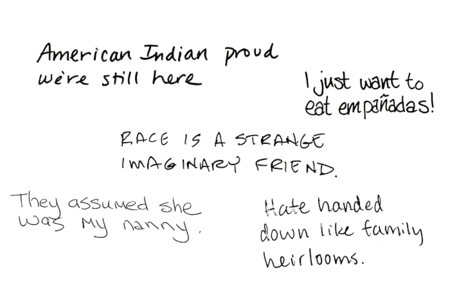
This is a poignant article about a project that Michele Norris started that tapped into people's thoughts about race in a profound way--using only six words. This is a gift🎁link, so anyone can read the full interactive article, even if they don't subscribe to The Washington Post. Below are some excerpts from the article:
I have always cringed when the accusations fly about someone allegedly “playing the race card.” It’s usually a proxy for “You’re making me uncomfortable, so please stop talking.” Or a diversionary tactic used to avoid having to speak about race with any kind of precision or specificity. A shorthand for “Just shut up.” And so, in 2010, I flipped the script, turning that accusatory phrase into a prompt to spark conversation. I printed 200 black postcards at my local FedEx Kinko’s on upper Wisconsin Avenue asking people to condense their thoughts on race or cultural identity into one sentence of six words. The front of the cards simply read:
Race. Your thoughts. 6 words. Please send.
I left the cards everywhere I traveled: in bookstores, in restaurants, at the information kiosks in airports, on the writing desks at all my hotels. Sometimes I snuck them inside airline in-flight magazines or left them at the sugar station at Starbucks. I hoped a few of those postcards would come back, thinking it would be worth the trouble if even a dozen people responded. Much to my surprise, strangers who stumbled on the cards would follow the instructions and use postage stamps to mail their six-word stories back to me in D.C. Since my parents were both postal workers, this gave me an extra thrill. Here I was, doing my part to support the Postal Service. Who says snail mail is dead? Half a dozen cards arrived within a week, then 12, then 20. Over time, that trickle became a tide. I have received more than 500,000 of these stories — and more arrive every day, though the vast majority of submissions now arrive through a website portal online. They have come from all 50 states and more than 100 countries. Though limited to six words, the stories are often shocking in their candor and intimacy. They reveal fear, disappointment, regret and resentment. Some are kissed by grace or triumph. A surprising number arrive in the form of a question, which suggests that many people hunger not just for answers but for permission to speak their truths. It was amazing what people could pack into such a small package:
Reason I ended a sweet relationship
Too Black for Black men’s love
Urban living has made me racist
Took 21 years to be Latina
Was considered White until after 9/11
Gay, but at least I’m White
I’m only Asian when it’s convenient
To keep the conversation going, I created a complementary website for the Race Card Project, where people could submit their six-word stories online. Over time we added two words to the submission form: “Anything else?” That changed everything. People sent in poems, essays, memos and historical documents to explain why they chose their six words. The archive came alive. It became an international forum where people could share their own stories but also learn much about life, as if it were lived by someone else.
I highly recommend reading the entire article, using the above gift link. As an olive-skinned Italian American, with curly hair, I have often felt like I am a walking Rorschach test for race. Even though I'm classified as "white" in the U.S., I've had people ask me if I'm a Latina, a Native American, Black, Egyptian, Jewish, and even a South Pacific Islander. Given my history, here are my six words on race.
A book is not it's cover.
I welcome people adding to this post their own 6 words on race.
#race#six words#feelings about race and identity#martin luther king day#michele norris#the washington post#gift link
39 notes
·
View notes
Text
Write the Year 2023—Week 31: Come On, Nature
This is an odd thing. I was sort of attracted to a Reedsy prompt this week: “Write about two strangers who are both heading to the same destination and agree to do a long distance drive together” (okay, I guess these two are not strangers), but I was just daunted by the idea of embarking on a story (as I have, as always, left this until the very last minute). But then I remembered that I really…
View On WordPress
#Allen Ginsberg#American Sentence Poem#Fiction#Flash Fiction#Poem#Poetry#Reedsy#Write the Year 2023#Writing
1 note
·
View note
Text

Cicada Sentences Vol. 2, 7.10.24 “Friday Worksite"
@env0writes C.Buck Ko-Fi & Venmo: @Zenv0 Support Your Local Artists! Photo by @env0
The machine sun stings like lost love Pin Pricked across my smile-circled cheeks Bloodletting blush All while sweat flushes me swimming Standing, canopied, brimming with midday haze
I look to the distant asphalt mirage Wherein lie, deceitful futures Through fence lines, twines, twigs, and decadent figs Saywered cars surround it all Buzzing, just like cicada broods
Shade is sought like valuable water How much paler the sky now appears As though any greenery need gold its presence Eminent in the domain of life and light Sending a sunset reminder to my face
#writeblrcafe#poeticstories#poetryportal#twc#spilled ink#wutispotlight#writtenconsiderations#alt lit#burningmuse#work poem#american gothic#american#art#artists on tumblr#artists of tumblr#short poem#tom sawyer#sunburn#cicada sentences#midwest gothic#cicada sentences vol. 2#env0 writes#midwest poet#chicago poet#twcpoetry#writerscreed#abstractcommunity
12 notes
·
View notes
Text
“I think I am probably in love with silence, that other world. And that I write, in some way, to negotiate seriously with it. If poems are records of true risks (attempts at change) taken by the soul of the speaker, then, as much as possible, my steps are towards silence. Silence which drowns us out, but also which ignores us, overrides us, silence, which is doubt, madness, fear, all that which makes the language bend and slip. I need to feel the places where the language fails, as much as one can. Silence which is awe or astonishment, the speech ripped out of you. All forms of death and mystery, therefore, working in each poem against the hurry of speech, the bravery of speech. And I think it is very important to feel the presence of that ocean in the poem, in the act of writing the poem. Its emissaries are the white space, of course, the full stops. But, also, all acts of grammar, which are its inroads. And the way the lines break, or slow. I’d like to think you can feel, by its accurate failures, the forces pressing against the sentence, the time order. And certain kinds of words, too, are messengers of silence. Not just vagueness and inaccuracy, but prepositions and conjunctions, for instance; and diction deliberately flattened to deaden pain. And certain sounds that deepen and slow the poem into sounds you can’t hear–all the long vowels in the sharp teeth of consonants. And echoes, and what is said by implication, by default … Because there is, of course, always the desire, the hope, that they are not two separate worlds, sound and silence, but that they become each other, that only our hearing fails.”
Jorie Graham, “Some Notes on Silence” in 19 New American Poets of the Golden Gate
171 notes
·
View notes
Text
The Eighth Day of Imagination in Reality
Imagination in Reality (neighbor’s security light in four directions) by Maria L. Berg 2023 For this morning’s photographic adventure, I set out to capture the reality in imagination and the imagination in reality. That reads like the definition of what I do every day, so it feels wide open in terms of shapes, line, color, and composition. I cut a filter using a combination of shapes and headed…

View On WordPress
#abstract photography#Allen Ginsberg#art#contradictory abstract nouns#Contradictory Abstractions#imagination#light-forming photography#NaNoWriMo 2023#NaNoWrMo#new poem#November PAD Chapbook Challenge#November Photography Challenge#reality#The American Sentence
0 notes
Text
writing patterns tag game
Rules: list the first line(s) of your last 10 posted fics and see if there's a pattern!
Tagged by @dustdeepsea . Thank you for thinking of me! How did you format your list so well? ghfdfghdfg Mine looks all squished
Upon The Hill (Wyll & Gale, Wyll & OC, bg3, one-shot, fluff, rated T) Wyll had spent the past week going through his father’s bookshelves.
A Hopeless Dove (Zevlor/Raphael, bg3, one-shot, adventure & romance, rated M) The cliffs in Rivington smelled of civilization.
Passion In A Glass House (Ferdinand/Sylvain/Lorenz, fe3h, one-shot, fluff, rated T) Aegir was beautiful in the summer.
Shared Ink And Interests (Ferdinand & Sylvain & Lorenz, fe3h, one-shot, modern au, fluff, rated T) Lorenz’s home was bright as it was full.
Hidden Talent Brawling (Constance & Hapi, Constance & Balthus, fe3h, one-shot, fluff, rated T) Constance saw magic in everything.
Bad At Biting (Astarion/Étoile (Tav), bg3, part 6 of series, vampire bites, rated M) Astarion sat up upon his bedroll, tracing bruises up and down his arms with fascinated fingers.
Stargazing (Astarion/Étoile (Tav), bg3, part 5 of series, fluff, rated M) Astarion had centuries of experience with well-meaning idiots and adventurers who believed they had done or could do some good in the world if only they were challenged, or recognized, or lucky.
Fragile As Stone (Rodrigue/Eugénie (rodwife oc), fe3h, part 2 of series, hurt/comfort, rated M) The glow of faith magic had long since faded from his hands, and yet still Rodrigue held Eugénie in the quiet of their bedroom.
The Blue Hour (Frederick/Stahl/Cordelia, fe:a, one-shot, fluff, rated T) Marriage had done little to keep Stahl from sleeping alone.
The Horror of Honor (Rodrigue & Glenn, fe3h, one-shot, poetry, grief/mourning, rated T) The honor of the north is blue as morning
I can never decide between American and British spelling. Oh well. Lots of little sentences as my openers...
I'll tag @the-eldritch-it-gay, @umbralstars, @sevarix-blogs, @recurringwriter, @lemonbronze, @razrogue, @lucius-the-sinful, @bladesandstars, @klkirbles, @ghostwise, @allycryz and YOU.
And while there's also some sentences of context in that last fic, The Horror of Honor, I'm going to post that whole poem again below the cut:
The honor of the north is blue as morning As fickle as the sea Spring comes, spring comes, spring comes And still the frozen earth won’t accept the seed
The horror of the north is blue as mourning As chilling as can be Harvest, harvest, harvest now And at the frozen hearth we’ll feed
#long post#ask to tag#okay. okay. it's apparently been a million years since i finished a sm/ut fic#and i even have like 3+ more nonsense fluff fics i want to finish so it's going to be. longer#but shocked#because i have sooo many se/xual wip's and headcanons i bother friends with fdghdfghdfgh
20 notes
·
View notes